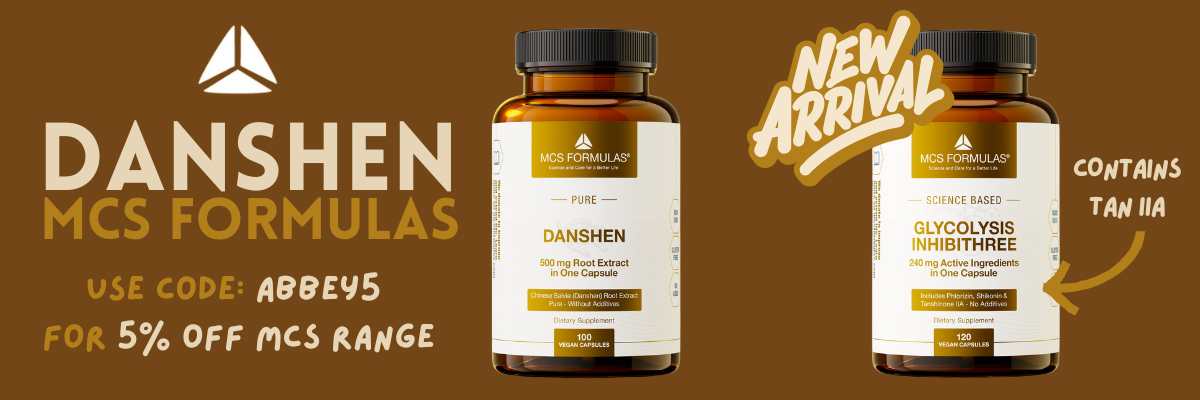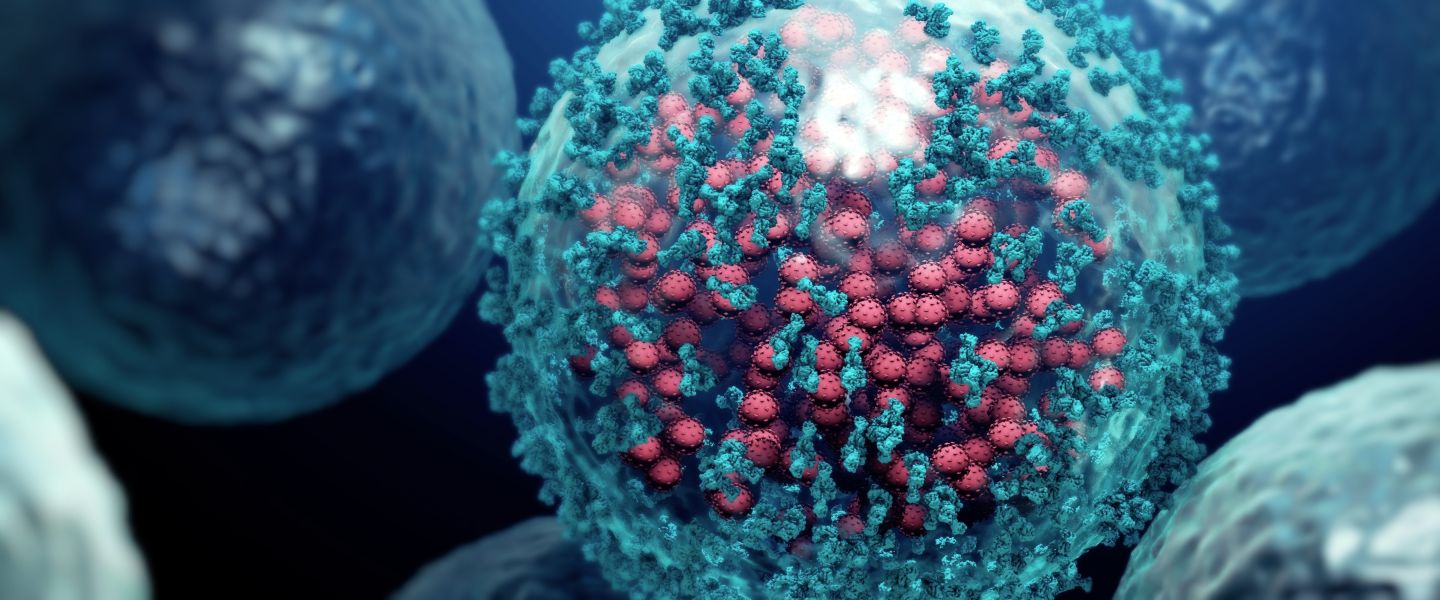SHARING / REPOSTING GUIDELINES: We're very happy to have posts/articles shared as direct links.
However, if you are replicating and re-posting information from this website or our posts, Abbey requests that you:
A) Only ever share articles in part (not in full). (eg. You can lift a paragraph as a way of introducing your readers to the topic) B) Be sure to always provide a direct link/URL back to the full original article here on the MyHealingCommunity.com website. Thanks in advance for your co-operation when sharing and re-posting any and all information that appears on this website.
Introduction
Salvia miltiorrhiza, also known as Danshen, Chinese Salvia root extract, Chinese sage, Tan Shen, or Red Sage, is a traditional Chinese medicinal herb known for its diverse therapeutic properties, cardiovascular benefits and anticancer effects. This cancer-specific summary provides an overview of the evidence supporting the use of Danshen in cancer treatment, focusing on its mechanisms of action, cancer types, dosages, and precautions, especially concerning CYP3A4 interactions and anticoagulant use.
Numerous studies, including systematic reviews and meta-analyses, have demonstrated the potential benefits of Danshen and its bioactive compounds, such as Tanshinone IIA, Tanshinone I, and Dihydroisotanshinone I, in cancer treatment.
High-quality randomised controlled trials (RCTs) have shown that Danshen formulae, combined with conventional chemotherapy, improved treatment outcomes and reduced side effects.
The systematic review and meta-analysis included 13 RCTs involving 1,045 participants. The studies investigated the effects of Danshen formulae on various types of cancer, including:
Lung Cancer: 5 studies
Leukemia: 3 studies
Liver Cancer: 3 studies
Breast or Colon Cancer: 1 study
Gastric Cancer: 1 study
The meta-analysis revealed several significant improvements in treatment outcomes when Danshen formulae were combined with chemotherapy:
-
Response Rate (RR): The experimental group showed a significantly higher response rate than the control group (OR 2.38, 95% CI 1.66-3.42).
-
1-Year Survival Rate: Patients treated with Danshen formulae had a higher 1-year survival rate (OR 1.70, 95% CI 1.22-2.36).
-
3-Year Survival Rate: The 3-year survival rate was also higher in the Danshen group (OR 2.78, 95% CI 1.62-4.78).
-
5-Year Survival Rate: The most notable improvement was seen in the 5-year survival rate (OR 8.45, 95% CI 2.53-28.27).[1][9].
Population-based studies:
Data from the Taiwan National Health Insurance Research Database (NHIRD) indicate that Danshen improves survival rates in patients with breast, colon, and bladder cancers[2][5][8].
In Vitro and In Vivo Studies:
Laboratory and animal studies have elucidated the molecular mechanisms by which Danshen compounds induce apoptosis, inhibit proliferation, and suppress metastasis in various cancer cell lines[6][7][10].
Cancer Stem Cell Signaling Pathways
Danshen and its active compounds modulate several key signalling pathways involved in cancer progression:
PI3K/Akt/mTOR Pathway: Tanshinone IIA and other Danshen compounds inhibit this pathway, reducing cell proliferation and increasing apoptosis[4][15].
JAK/STAT3 Pathway: Cryptotanshinone targets this pathway, inhibiting the crosstalk between macrophages and cancer cells, which is crucial for tumour growth and metastasis[4][6].
MAPK Pathway: Tanshinones modulate this pathway, contributing to their anticancer effects[6].
HypoxiaInducible Factor (HIF1α): Tanshinone I reduces HIF1α accumulation, inhibiting tumour angiogenesis[14].
Learn more about cancer stem cell pathway inhibitors here: https://myhealingcommunity.com/targeting-cancer-stem-cells/
Tanshinone IIA (Tan IIA) is a lipophilic compound derived from the roots of Salvia miltiorrhiza (Danshen).
TanIIA exhibits anticancer properties through multiple mechanisms:
- Inhibition of Glycolytic Enzymes: Tan IIA inhibits key glycolytic enzymes such as HK2, PKM2, and LDHA, disrupting cancer cell metabolism and reducing tumour growth.
- Modulation of Signaling Pathways: Tan IIA affects several signalling pathways, including PI3K/Akt, MAPK, and JAK/STAT3, leading to apoptosis and reduced proliferation in various cancer types.
- Induction of Autophagic Apoptosis: Tan IIA induces autophagic apoptosis via the Beclin1 pathway, particularly in non-small cell lung cancer (NSCLC) cells.
- Enhancement of Chemosensitivity: Tan IIA enhances the sensitivity of cancer cells to chemotherapeutic agents by downregulating efflux transporters and inhibiting pathways like PTEN/AKT.
Efficacy of Tan IIA in Different Cancer Types
Breast Cancer
Effectiveness: Tan IIA significantly inhibits the growth of both ER-positive and ER-negative breast cancer cells in a dose- and time-dependent manner[2].
Mechanism: It induces apoptosis by regulating cell proliferation and apoptosis genes, such as P53 and Bcl2[2].
Tanshinone IIA in HER2+ Breast Cancer
Study Type: In vitro and in vivo
Cancer Type: HER2+ Breast Cancer
Cell Lines: MDAMB453, SKBR3, BT474
Various concentrations used in studies
Findings: Tanshinone IIA significantly inhibited the growth of HER2overexpressing breast cancer cells. It induced apoptosis through upregulation of proapoptotic proteins and downregulation of antiapoptotic proteins.
Mechanism: Inhibition of NFκBp65 and activation of caspase3.
Reference: Anticancer Effect of Tanshinones on Female Breast Cancer https://www.ncbi.nlm.nih.gov/pmc/articles/PMC8822147/
Acetyltanshinone IIA (ATA) in HER2+ Breast Cancer
Study Type: In vitro and in vivo
Cancer Type: HER2+ Breast Cancer
Cell Lines: MDAMB453, SKBR3, BT474
Various concentrations used in studies.
Findings: ATA inhibited the growth of HER2positive breast cancer cells more effectively than lapatinib, a standard HER2-targeted therapy. It degraded HER2 protein and inhibited cell proliferation.
Mechanism: Increased ROS generation, activation of caspase3, and cytochrome c release.
Reference: An overview of the anticancer actions of Tanshinones, derived from Salvia miltiorrhiza. https://www.ncbi.nlm.nih.gov/pmc/articles/PMC9400791/
NonSmall Cell Lung Cancer (NSCLC)
Effectiveness: Tan IIA inhibits NSCLC growth by inducing autophagic apoptosis through the Beclin1 pathway[5].
In Vivo Studies: Preclinical studies in mouse models have shown significant tumour growth inhibition with Tan IIA treatment[5].
Bladder Cancer
Effectiveness: Tan IIA suppresses bladder cancer cells' proliferation, migration, and metastasis [1].
Mechanism: It downregulates glycolytic enzymes and related signalling pathways, reducing cancer cell viability[1].
Gastric Cancer: Tan IIA, in combination with chloroquine, inhibits tumour growth more effectively than monotherapy[1].
Osteosarcoma: Tan IIA inhibits proliferation, migration, and invasion of osteosarcoma cells and induces apoptosis[1].
Conclusion: Tanshinone IIA exhibits significant anticancer effects across various cancer types by targeting glycolytic enzymes HK2, PKM2, and LDHA. Studies indicate its potential as a therapeutic agent, particularly for NSCLC and OSCC.
Danshen has shown efficacy against a variety of cancers:
Breast Cancer: Studies indicate that Danshen compounds like Dihydroisotanshinone I induce apoptosis and ferroptosis in breast cancer cells, improving patient survival rates[2][7].
Clinical Study on Danshen in Breast Cancer
Study Type: Population-based cohort study
Cancer Type: Breast Cancer (including HER2+)
Population: 79,335 patients with breast cancer
Findings: Danshen use at 3g three x per day was associated with improved survival rates in breast cancer patients.
Colon Cancer: Dihydroisotanshinone I inhibits the proliferation of colon cancer cells and induces apoptosis, as evidenced by both in vitro and in vivo studies[8].
Prostate Cancer: Danshen compounds target the STAT3/CCL2 signalling pathway, reducing tumour growth and metastasis[4].
Bladder Cancer: Retrospective studies suggest that Danshen reduces the risk of major adverse cardiac events (MACE) and allcause mortality in bladder cancer patients[5].
Dosage and Administration
The dosage of Danshen varies depending on the formulation and the specific cancer being treated. Common dosages used in studies include:
Breast Cancer: A typical dosage is 3 grams daily for 28 days[7]. Equiv. to 2 x 500mg capsules 3 x day.
General Cancer Treatment: Danshen is often prescribed three times a day (TID), with total dosages varying based on the specific formulation and patient needs[2].
Precautions
CYP3A4 Interactions:
Danshen can activate the CYP3A4 enzyme, potentially altering the metabolism of other drugs metabolised by this enzyme. This interaction can reduce the efficacy of certain medications, necessitating careful monitoring and dosage adjustments[3][13].
Anticoagulants:
Danshen has anticoagulant properties, which can increase the risk of bleeding, especially when used in conjunction with other anticoagulant or antiplatelet drugs:
Warfarin:
Danshen can enhance the effects of warfarin, increasing the risk of bleeding. Patients should be closely monitored, and dosage adjustments may be necessary[12][16].
Other Anticoagulants:
Similar precautions apply to other anticoagulants like dabigatran and edoxaban, which are affected by Pgp modulation and CYP3A4 interactions[13].
Dosing and CYP34a:
To match the breast cancer retrospective study, you would consider 2 capsules 3 times daily. The concentration of active compounds in the 1g dose taken 3 times daily would likely be high enough to cause initial inhibition of CYP3A4. However, with repeated dosing, there may be a shift towards induction of CYP3A4. Given the complex and potentially biphasic nature of Danshen's effects on CYP3A4, careful monitoring would be advisable if using this herb concurrently with medications (like CDK4/6 inhibitors) metabolized by CYP3A4. The potential for inhibition and induction highlights the need for caution and possibly adjusting dosages of co-administered drugs metabolized by CYP3A4 [14].

Trusted Danshen Product
Product Name: Danshen, 500mg
-
Manufacturer: MCS Formulas: https://www.mcsformulas.com/vitamins-supplements/danshen/ref/14
-
Formulation: Whole plant extract of Salvia miltiorrhiza (Danshen), also known as Chinese Salvia root extract, Chinese sage, Tan Shen, or Red Sage.
-
Key Features: Whole Plant Extract: Contains both hydrophilic (e.g., salvianolic acid A and B, danshensu) and lipophilic (e.g., dihydrotanshinone, tanshinone I, tanshinone IIA and IIb) compounds.
-
Pure with No Additives: No additives are included in the capsule manufacturing process.
-
Made in EU: Manufactured in the Netherlands.
-
Vegan Capsules and Ingredients: Suitable for vegans
-
Use the 5% discount code abbey5 to receive 5% off all MCS Formulas and support Abbey to deliver a wide range of research support to the members of the Healing Cancer Study Support Group at no cost to the group members.
References
-
Danshen Formulae for Cancer: A Systematic Review and MetaAnalysis of HighQuality Randomized Controlled Trials https://www.hindawi.com/journals/ecam/2019/2310639/
-
Danshen Improves Survival of Patients With Breast Cancer and Dihydroisotanshinone I Induces Ferroptosis and Apoptosis of Breast Cancer Cells https://www.ncbi.nlm.nih.gov/pubmed/31736748
-
An overview of the anticancer actions of Tanshinones, derived from Salvia miltiorrhiza (Danshen) https://pubmed.ncbi.nlm.nih.gov/24123144/
-
Molecular evidence of cryptotanshinone for treatment and prevention of human cancer https://www.ncbi.nlm.nih.gov/pmc/articles/PMC3625674/
-
Effect of Danshen for improving clinical outcomes in patients with bladder cancer https://www.frontiersin.org/journals/pharmacology/articles/10.3389/fphar.2023.1260683/full
-
Review of Danshen: From its metabolism to possible mechanisms of its biological activities https://www.explorationpub.com/Journals/etat/Article/100210
-
Danshen improves survival of patients with colon cancer and dihydroisotanshinone I inhibit the proliferation of colon cancer cells via apoptosis https://www.frontiersin.org/journals/pharmacology/articles/10.3389/fphar.2019.01226/full
-
A Review of Potential Harmful Interactions between Anticoagulant Drugs and Chinese Herbal Medicines https://pubmed.ncbi.nlm.nih.gov/28807849/
-
Efficacy Of Danshen Formulae For Supporting Cancer Treatment https://www.souladvisorfoundation.org/efficacy-of-danshen-formulae-for-supporting-cancer-treatment/
-
Dihydroisotanshinone I as a Treatment Option for Head and Neck Cancer https://www.mdpi.com/1422-0067/22/16/8881
-
DANSHEN Uses, Side Effects, and More WebMD https://www.webmd.com/vitamins/ai/ingredientmono-931/danshen
-
Drug Interactions Affecting Oral Anticoagulant Use | Circulation https://www.ahajournals.org/doi/10.1161/CIRCEP.121.007956
13. Danshen: Health Benefits, Side Effects, Uses, Dose & Precautions https://www.rxlist.com/supplements/danshen.htm
14. Effect of Danshen extract on the activity of CYP3A4 in healthy volunteers https://www.ncbi.nlm.nih.gov/pmc/articles/PMC2883758/
Healing Cancer Study Support Facebook Group Members:
Group members can click here when logged into Facebook to visit the Study Support Group conversation thread dedicated to DanshenDanshen Extra..
My mini Review of the current Tanshinone IIA (Tan IIA) research.
Mini Review of Tanshinone IIA Research Citations
-
Tanshinone IIA inhibits cell growth by suppressing SIX induced...
https://www.ncbi.nlm.nih.gov/pmc/articles/PMC9073574/ -
Natural products targeting glycolysis in cancer PMC NCBI https://www.ncbi.nlm.nih.gov/pmc/articles/PMC9663463/
-
Tanshinone IIA inhibits oral squamous cell carcinoma via reducing... https://www.nature.com/articles/s4141902025799
-
An overview of the anticancer actions of Tanshinones, derived from Salvia miltiorrhiza https://www.ncbi.nlm.nih.gov/pmc/articles/PMC9400791/
-
Anticancer Effect of Tanshinones on Female Breast Cancer https://www.ncbi.nlm.nih.gov/pmc/articles/PMC8822147/
-
Tanshinone IIA: A Review of its Anticancer Effects https://www.ncbi.nlm.nih.gov/pmc/articles/PMC7883641/
-
Tanshinone IIA Suppresses NonSmall Cell Lung Cancer Through Beclin1Mediated Autophagic Apoptosis https://www.sciencedirect.com/science/article/pii/S2095809921003519
* MCS offers ULTRAFAST WORLDWIDE SHIPPING with FedEx and UPS
** MCS are a SOCIAL ENTERPRISE - see the We Donate 50% program
DISCLAIMER: Any and all information in this post was gathered from published research in cell lines or animals, or from typical clinical use. It may not be complete, may not have not been verified in humans, and is NOT meant or given as medical advice, but only as a guide to further exploration.







